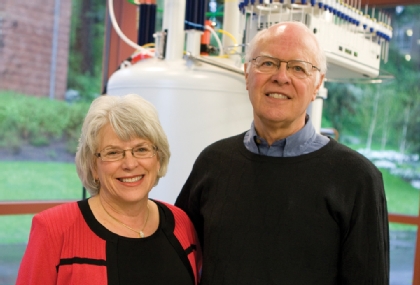Page 14 • (881 results in 0.018 seconds)
-

Assistant Professor of Marriage and Family Therapy | Marriage and Family Therapy | alexus.hamilton@plu.edu | 253-535-8167 | Dr.
Alexus Hamilton Assistant Professor of Marriage and Family Therapy she/her Phone: 253-535-8167 Email: alexus.hamilton@plu.edu Office Location:Garfield Station - Room 112 Professional Biography Education Ph.D., Couple and Family Therapy, University of Iowa, 2023 Master, Marriage and Family Therapy, Abilene Christian University, 2019 Bachelor of Science, Human Development and Family Studies, Texas Tech University, 2015 Areas of Emphasis or Expertise Strengthening supports for Black therapists
-

A summer job that doesn’t suck By Steve Hansen Of all the potentially tedious summer jobs, here’s a new one: spending hours on your knees, rolling over one boulder after another, just to see what’s underneath. For Stephanie Agoncillo ’08 and Melissa Youngquist ’09, this…
. In the natural sciences alone, each summer, more than nine faculty members worked with more than 21 students to conduct fieldwork, as well as gather and analyze data. And the number of projects keep on growing. The trio was part of nine student-faculty summer research projects in the natural sciences, many of which conducted fieldwork in the nearby forests, mountains and coastal areas of the Pacific Northwest. It is why they are here, just a couple hours away from the PLU campus, ankle-deep in
-

Ensuring access to essential PLU programs By Steve Hansen Tim Vialpando ’02 has had an active relationship with PLU, both as a student and as a graduate. As a student, he served as ASPLU president and participated in the study group that developed the Wild…
be able to name a seat in the remodeled auditorium. It won’t have his name on seat – it will have the names of his parents. “It is a way for me to honor my parents for the contribution they made to my education,” he said. Read Previous Alumna finds good fit at PLU Read Next A generous couple COMMENTS*Note: All comments are moderated If the comments don't appear for you, you might have ad blocker enabled or are currently browsing in a "private" window. LATEST POSTS Caitlyn Babcock ’25 wins first
-

LeMays see good stewardship on campus and seek to support it By Steve Hansen Gene ’62 and Carla (Hansen) ’64 LeMay met on the PLU campus when a mutual friend suggested to Gene that there was “this gal” that might need some tutoring. It is…
students now to have that same opportunity. “PLU is a good steward of what they have,” Gene said. “It makes it a lot easier to give a gift, because we know they will take care of it and put it to very good use.” Read Previous Alumna finds good fit at PLU Read Next A generous couple COMMENTS*Note: All comments are moderated If the comments don't appear for you, you might have ad blocker enabled or are currently browsing in a "private" window. LATEST POSTS Caitlyn Babcock ’25 wins first place in 2024
-
News articles and blog posts from Pacific Lutheran University.
Musician turned math major is excited to teach in his community Kevin Canady-Pete ’22 has a history with the Pacific Lutheran University campus. He grew up down the street, just a couple of miles from the university. The Franklin Pierce High School graduate came to PLU intending to pursue a music education major. While he enjoyed… May 4, 2022 AcademicsCurrent StudentsMathematicsMusicPLU GradsService
-

Cause Haun ’93 went from frustrated mom searching for appropriate children’s footwear to owner of a shoe company worthy of Nordstrom’s shelves.
flexibility akin to bare feet. The shoes that did exist couldn’t withstand the elements in the family’s rainy home in the Pacific Northwest. Cause Haun, standing in the See Kai Run headquarters in Bothell, holds an image of one of the first shoes she designed. (Photo by John Froschauer/PLU) Then, Haun stumbled upon well-crafted, flexible, rubber-soled shoes that fit the bill during a China trip to visit her husband’s family. So, the couple filled a suitcase full of shoes and brought them home to test the
-
All students who live off campus are members of the Lutes Commute Community. Learning Communities are for all PLU students.
most up-to-date hours). The CAVE serves as an on-campus community & lounge space for all commuter students. This space is designed to provide a home-away-from-home for students to rest, study, and eat between classes. This space is staffed and facilitated by Commuter Advocates, which are student leaders that create and implement opportunities for commuter students to build relationships and be part of a dedicated community at PLU. Commuting to Campus? Check out these resources:The CAVEA dedicated
Commuter & Transfer Student ConnectionsPacific Lutheran University Tacoma, WA 98447-0003 -

The Faculty Excellence Award in Mentoring recognizes the efforts of a faculty member who serves as a personal or professional guide to students or colleagues and makes a profound difference in the lives of others as a role model, confidant, critic or co-learner. Professor of…
colleague shared, “Dr. Shore initiates mentoring relationships with grace and care, seamlessly blending encouragement with constructive feedback.” In her nomination packet, colleagues and former students shared examples of Shore’s unwavering support and invaluable guidance during pivotal life moments, with the recurrent theme being her genuine concern for individual growth. Former students described how they continue to trust Shore with questions about professional and personal lives–a testament to the
-
We are a student-managed, student-run design and advertising solution for Pacific Lutheran University in Tacoma, WA.
Welcome to Impact!We are a student-managed, student-run design and advertising solution for Pacific Lutheran University in Tacoma, WA. Impact team members are creatively driven to shape meaningful relationships between students, faculty, and staff through our advertising platforms. Impact’s creative team consists of students of all ages, majors, skills, and backgrounds. We hope to work with you soon! Click the button below to learn more about all of our services and follow us on our Instagram
Office Hours Fall 24Monday: 2:30pm-3:30pmThursday: 9:00am-10:30amFriday: 10:45am-12:30pmSaturday: ClosedSunday: Closed -
Science Happens (and Much More) When Monika Maier ’09 was preparing for a month of fieldwork in the remote South Hills region of Idaho a year ago, she made sure to study-up on more than just crossbills, the birds they would be researching. She also…
research in the field. There are long hours collecting data – in this case, of the crossbills and the lodgepole pine cones on which they feed. And then there are times when everybody is sitting around the campground, unwinding, talking about whatever comes to mind. After all, there is little pretense when everybody knows exactly the last time everybody else took a shower. “I enjoy the relationships you can’t get otherwise,” said Smith. “When I was doing my fieldwork [as a doctoral candidate], I was
Do you have any feedback for us? If so, feel free to use our Feedback Form.


